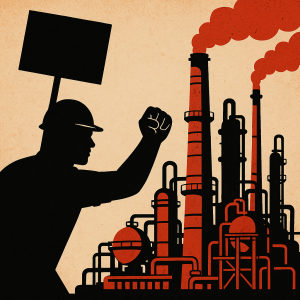
PENGASSAN vs. Dangote: Striking a Balance Between Workers’ Rights and National Stability
By Dr. Michael O. Omoruyi, iNewsAfrica | September 30, 2025
The Case for the Strike
At the heart of the conflict between PENGASSAN (Petroleum and Natural Gas Senior Staff Association of Nigeria) and the Dangote Group lies a fundamental issue: the right of workers to organize freely.
Nigeria is not merely a market economy; it is a democracy where the Constitution guarantees freedom of association. When Dangote employees claim they are being laid off for joining or supporting trade unions, it raises profound questions about labour rights in Africa’s largest economy. If the Dangote Refinery—celebrated as a national symbol of industrial pride—cannot respect these rights, then what message does that send to other corporations across the continent?
Strikes, though disruptive, have historically been the only language that entrenched interests understand. From the oil workers of the 1970s who forced concessions from multinational companies, to teachers and doctors who strike to demand fair treatment, industrial action has been a legitimate tool of resistance.
For PENGASSAN and its ally NUPENG, the current standoff is not just about 800 dismissed workers. It is about establishing a precedent—that no employer, however wealthy or well-connected, is above the rights of Nigerian labour. Allowing this dispute to go unchallenged would normalize a culture where corporations dictate terms and workers are left voiceless.
The Case Against the Strike
Yet, there is another side that cannot be ignored. The Dangote Refinery is not just any company; it is the linchpin of Nigeria’s ambitious plan to end decades of fuel import dependence. A nationwide shutdown of its operations, even for a week, could trigger cascading effects: fuel shortages, transportation crises, higher food prices, and an energy shock in a country already battling inflation and unemployment.
Ordinary Nigerians—already carrying the heavy burden of economic hardship—will pay the steepest price if this strike escalates. The unions may defend worker dignity, but what about the dignity of millions of citizens stranded at bus stops, unable to afford fuel, or enduring blackouts because power plants cannot get gas supply?
Furthermore, one cannot dismiss Dangote’s argument that certain workers engaged in sabotage or disruptive behaviour. While union rights must be protected, discipline and accountability are also essential in a multibillion-dollar operation that powers the lifeblood of the economy. Strikes should be the last resort, not the first weapon drawn.

The Balancing Act
The Balancing Act
This clash between PENGASSAN and Dangote is more than a labour dispute—it is a test of Nigeria’s maturity as both a democracy and an economy. Can we safeguard the rights of workers without crippling a refinery that could save us billions in foreign exchange? Can unions push for justice without holding the nation hostage? Can Dangote demonstrate true leadership by negotiating in good faith rather than flexing corporate muscle?
The answer must lie in dialogue, transparency, and compromise. The federal government’s mediation efforts should be more than perfunctory; they must produce enforceable agreements that both protect union rights and guarantee uninterrupted refinery operations. Anything less is a betrayal of both the workers and the citizens who depend on the promise of a more secure energy future.
Final Word
In the end, strikes are double-edged swords: they cut through injustice, but they can also wound the very society they aim to heal. Nigeria stands at a crossroads. If we get this balance wrong, the refinery that was meant to symbolize hope may instead become a battlefield of distrust. If we get it right, it could mark the dawn of a new social contract—where investment thrives and workers are not silenced in the name of progress.
Dr. Michael O. Omoruyi is a technologist, author, and founder of iNewsAfrica. He writes on Africa’s digital transformation, labour rights, and socio-economic development.

Dr. Omoruyi’s memoir launches across Amazon and other bookstores Worldwide October 21, 2025











